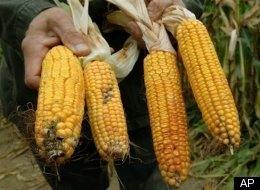
genetically-modified-food-tomatoes-syringes-photo.jpg
Photo credit: David Gould / Getty Images
GMO Bans, Laws, and Labels from Around the World
by Collin Dunn, Corvallis, OR, USA on 12. 3.09
Food & Health
Prince Charles has called them the "biggest environmental disaster of all time," while agriculture industrialists like Monsanto swear they're safe for human consumption and a boon for the environment. Genetically modified foods are nothing if not controversial, and that controversy spans the globe. From Ireland and the European Union to Africa and Japan, and all the way back to the U.S., various bans, laws, and labels can make GMOs difficult to keep up with. Here's a roundup of the world in GMOs.
Corn is one of the world's most modified crops.
Ireland Bans Growth of GMOsIreland recently banned the growth of any genetically modified foods, and the country has also made available a GMO-free label that can be placed on animal products like meat, poultry, eggs and dairy, fish, and crustaceans, that are raised with feed free of GMOs. The government's two coalition partners signed the agreement [pdf] that officially declares Ireland a "GM-free Zone." That's good news for no-GMO advocates in the United States, since it imports a good bit of Irish dairy; lots of casein for cheese production comes to the U.S. from Ireland.
Egypt Bans Import/Export of GMOsIn a move that has as many implications for world trade as it does for agriculture, Egypt has banned the import and export of GMOs. That means that none can come in -- meaning they can't import from any countries growing GMO foods they want -- and none can leave -- meaning they can't grow any GMOs, either. This sets in motion a complex agripolitical dance involving many countries where agriculture is a big part of foreign trade.
For example, "A non-GMO policy would not cause difficulties for sunflower oil but it would for soyoil," according to one European trader. "It would mean that soyoil imports would only be possible from Brazil and not from the U.S. or Argentina." The countries are the world's three largest producers, so Egypt's decision cuts two out of that equation; it remains to be seen if the ban will leverage more GMO-free growth in other countries.
Japan Says No to GMOThough Japan imports a lot of food from countries still growing and exporting GMO foods -- Australia, the U.S., and Canada, to name a few -- they are staunchly opposed to consuming GMOs. Most of the soy and corn -- two of the most frequently modified foods -- that enter Japan is carefully sourced explicitly as "non-GM," using expensive traceability schemes, but that doesn't cover all of their bases. Keisuke Amagasa, of the Tokyo-based No! GMO Campaign, summed it up:
Japan does not produce any GM crops. However, because Japan imports GM canola from Canada, GM contamination has already occurred and it is spreading to a much greater degree than one could imagine. Judging by the ominous precedent of Canada, once GM crops are cultivated, segregation between GM and non-GM will become almost impossible, and keeping pure non-GM varieties away from GM contamination will be very hard.
France Defines GMO-free LabelingCurrently, there is no European regulation on what constitutes GMO-free, although products that contain more than 0.9 percent genetically modified ingredients must indicate GM content on their labels. That doesn't apply to animals, though, and their meat and dairy products don't require a distinction whether they were fed GMO foods or not.
In France, the Haut Conseil des Biotechnologies is attempting to clear things up, when it comes to the labeling used to identify GMOs; their recent recommendations are expected to become law in the second half of 2010. These recommendations include an upgrade to a threshold of 0.1 percent for genetically modified material in plant products and animal feed, and a minimum distance between apiaries and fields where GM crops are grown (though that distance was not specified). Labels could then designate plant products as 'GMO-free,' animal products as 'fed on GMO-free feed' or 'derived from animals fed without GM feed,' and honey as 'biotech-free.' Stay tuned for final results on this one.
GMO Sorghum has made inroads in Africa.
GMO Sorghum Comes to AfricaDespite the growing tide against GMOs, they're finding their way (legally) into the food systems in some places. In South Africa, the government gave permission to proceed with trials of genetically modified sorghum, with the blessing of the Bill and Melinda Gates Foundation and DuPont, among other supporters. The justification is that, while it is one of the few crops that grows well in arid regions, it lacks most essential nutrients and it has poor protein digestibility; modifying it allows more nutrients to be "put" back in. Opponents of the decision are concerned that the introduction of the GMO crop threatens one of Africa's most important heritage crops.
The U.S. Bans GMOs. In Missouri. In a National Wildlife Refuge
While the U.S. has engaged in a much-publicized holdout from widespread GMO bans, a few small events have started the GMO-free ball rolling. A federal judge issued a ruling in Missouri stating that the U.S. Fish and Wildlife shouldn't have allowed genetically modified crops on a national wildlife refuge. That may not sound like much, but, thanks to the ruling, 37 farming contracts -- many being used for GMO soybean and corn crops -- have been canceled.
Will it lead to more widespread action? Whole Foods Market is on board with a GMO ban, having its store-brand products independently tested to certify that they contain zero GMO content -- who'll be next?
from: http://www.treehugger.com/files/2009/12/gmo-bans-laws-labels-around-the-world.php





